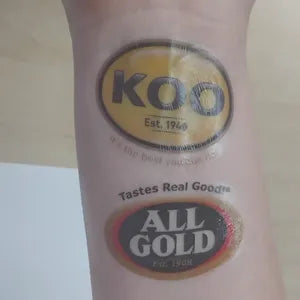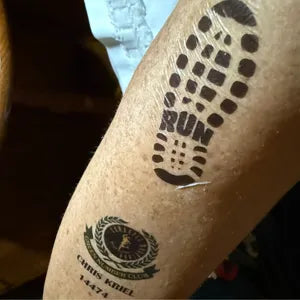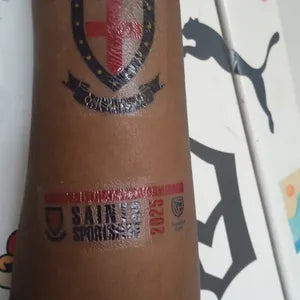Can Temporary Tattoos Cause Cancer Facts vs Fiction
TeMaRo Custom Temporary Tattoos is a South African online store, we aim to demystify the question "Can temporary tattoos cause cancer?"
Temporary tattoos have been a popular form of body art for centuries.

They are generally considered a safe alternative to permanent tattoos because they only last for a short period of time, usually a few days or weeks.
However, there have been concerns about the safety of temporary tattoos, and specifically, whether they can cause cancer.
What are Temporary Tattoos?
Temporary tattoos are genuine tattoo designs applied to the skin using a variety of methods, including transfer paper, stickers, and airbrushing.
The designs are generally made from non toxic temporary tattoo ink, dyes, and other pigments that are safe for use on the skin.
They can be found in a wide variety of designs, from simple black and white images to full-color graphics.
What are the concerns with Temporary Tattoos and Cancer?
There have been concerns that some temporary tattoos may contain harmful chemicals that could increase the risk of cancer.
Specifically, some of the concerns have centered around the use of black henna tattoos.
Black henna tattoos contain a substance called para-phenylenediamine (PPD).
PPD is a chemical that is commonly used in hair dyes and other cosmetic products.
It is also classified as a sensitizer, which means that it can cause an allergic reaction in some people.
PPD has been linked to several types of cancer, including bladder cancer, lung cancer, and non-Hodgkin's lymphoma.
There is also some evidence to suggest that PPD can cause skin cancer.
Black henna tattoos are often applied outside of regulated tattoo parlors and may be sold by street vendors or at fairs and festivals.
This means that the quality of the ink and the methods used to apply it may not be regulated.
What are the regulations for Temporary Tattoos in South Africa
Temporary tattoos are not regulated by specific laws in South Africa.
However, the Consumer Protection Act does require that all products should be safe for consumer use and comply with labeling requirements.
Additionally, it is recommended to use temporary tattoo products that have been approved by regulatory bodies in other countries, such as the US Food and Drug Administration (FDA) or the European Union's Cosmetic Products Regulation (CPR).
As always, it is advisable to use caution when applying any product to your skin.
What are the potential risks of temporary tattoos?
In addition to concerns about cancer, there are several other potential risks associated with temporary tattoos.
These include:
1. Allergic reactions: Some people may be allergic to the materials used to make temporary tattoos, including the ink and the adhesive.
2. Infections: If the skin is not properly cleaned before the tattoo is applied, there is a risk of developing an infection.
3. Scarring: If the skin is irritated or the tattoo is applied too aggressively, there may be scarring.
4. Skin discoloration: If the ink used in the tattoo is of poor quality or the tattoo is applied too aggressively, there may be permanent skin discoloration.
5. Keloids: In some cases, temporary tattoos may cause keloids, which are raised, thickened scars that can be difficult to treat.
What are the ways to reduce the risks of Temporary Tattoos?
There are several things that you can do to reduce the risks associated with temporary tattoos.
These include:
1. Choose a reputable temporary tattoo supplier: If you want to get a temporary tattoo, make sure that you choose a reputable product like TeMaRo Temporary Tattoos, team TeMaRo shows their confidence in their temporary tattoo designs using a quality guarantee or money back pledge.
2. Avoid Black Henna: To reduce the risk of exposure to harmful chemicals, avoid black henna tattoos.
3. Clean the skin: Before applying a temporary tattoo, make sure that the skin is clean and free of dirt and oil.
4. Follow aftercare instructions: After the tattoo has been applied, follow the aftercare instructions carefully to reduce the risk of infection.
5. Consider a patch test: If you have never had a temporary tattoo before, consider getting a patch test to check for any allergic reactions.
Conclusion:
In conclusion, while there have been concerns about the safety of temporary tattoos, the risk of developing cancer from temporary tattoos is generally considered to be low.
However, it is important to take precautions to reduce the risks associated with temporary tattoos, including choosing a reputable temporary tattoos stickers supplier, avoiding black henna tattoos, cleaning the skin before application, and following aftercare instructions.
If you have any concerns about the safety of temporary tattoos, talk to your doctor or a dermatologist.
TeMaRo Temporary Tattoos stickers are extremely safe.
TeMaRo has two types of temporary tattoos namely tattoo stickers and semi permanent tattoos.
Temporary tattoo stickers are made of soy ink while semi permanent tattoos' ink is made of Gardenia Juice
Semi permanent tattoos when transferred to your skin takes about 6 hours before the design is visible.
Another interesting feature about semi permanent tattoos is that the juice ink looks like a real tattoo.
Semi permanent temporary tattoo ink will last for a fortnight without fading.
Tattoo stickers on the other hand gives you instant gratification when you transfer the ink to your skin.
What this means is that unlike juice tattoos, temporary tattoo stickers' ink appears immediately after transfer and they last for maximum 3 days before fading.



















0 comments